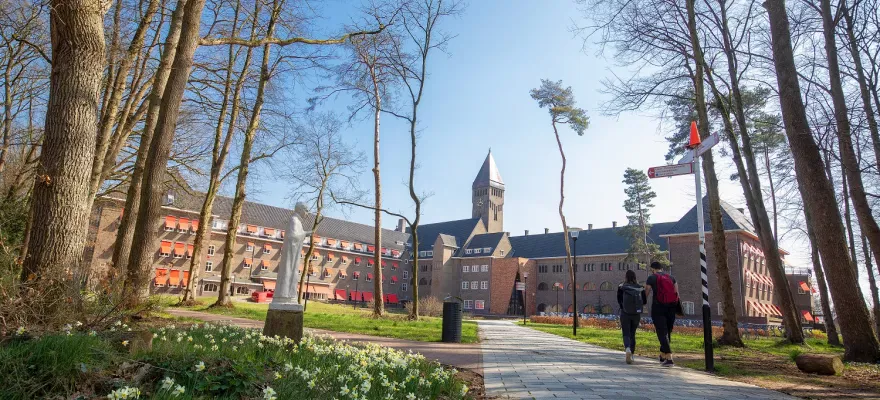IB ile Şartlı Kabul Nedir? Başvuru Süreci ve Avantajları
Üniversiteye başvururken IB ile şartlı kabul almak, öğrenciler için büyük bir fırsat sunar. IB diplomasına
Hollanda, Uluslararası Bakalorya (IB) diplomasına sahip öğrenciler için Avrupa’da en popüler üniversite destinasyonlarından biridir. Hollanda’daki üniversiteler, kaliteli eğitim ve yenilikçi öğrenim yöntemleriyle tanınır. Ayrıca İngilizce dilinde çok sayıda lisans programı sunması, uluslararası öğrenciler için cazip bir fırsat yaratır. Bu yazıda, IB diploması ile başvuru kabul eden önde gelen Hollanda üniversitelerine ve başvuru süreçlerine göz atacağız.
1. Amsterdam Üniversitesi (University of Amsterdam – UvA)
Hollanda’nın başkenti Amsterdam’da yer alan University of Amsterdam, IB diplomasına sahip öğrencileri kabul eden en prestijli üniversitelerden biridir. UvA, sosyal bilimler, hukuk, ekonomi, ve sanat tarihi gibi birçok alanda uluslararası düzeyde tanınan programlar sunmaktadır. Amsterdam gibi dinamik ve çok kültürlü bir şehirde eğitim almak da öğrencilere büyük avantajlar sunar.
2. Leiden Üniversitesi
Leiden Üniversitesi, Hollanda’nın en eski ve en prestijli üniversitelerinden biridir. IB diploması ile başvuru kabul eden bu üniversite, özellikle hukuk, tarih ve beşeri bilimler alanlarında tanınmış programlara sahiptir. Leiden ayrıca uluslararası öğrencilere destek sağlayan güçlü bir akademik ortam sunmaktadır.

3. Delft Teknoloji Üniversitesi (TU Delft)
Mühendislik ve teknoloji alanında dünya çapında üne sahip olan Delft Teknoloji Üniversitesi, IB diplomasına sahip öğrenciler için geniş bir lisans programı yelpazesi sunmaktadır. TU Delft, özellikle mühendislik, mimarlık, ve bilgisayar bilimleri alanlarında üstün akademik standartlara sahiptir ve yenilikçi projeleriyle bilinir.

4. Utrecht Üniversitesi
Utrecht Üniversitesi, Hollanda’da IB diplomasını kabul eden saygın üniversitelerden biridir. Özellikle sosyal bilimler, biyoloji, tıp ve beşeri bilimler alanlarında güçlü akademik programlar sunar. Utrecht, öğrencilere araştırma odaklı bir eğitim deneyimi ve uluslararası öğrenci topluluğu ile geniş bir sosyal ağ sunmaktadır.

5. Erasmus Üniversitesi Rotterdam
Erasmus Üniversitesi Rotterdam, IB diplomasına sahip öğrenciler için ekonomi, işletme, tıp ve hukuk alanlarında sunduğu programlarla tanınır. Üniversitenin ekonomi ve işletme fakültesi, dünya sıralamalarında üst sıralarda yer almaktadır. Rotterdam, aynı zamanda uluslararası iş dünyasının merkezlerinden biri olarak öğrencilere staj ve iş fırsatları sunar.

6. Groningen Üniversitesi
Groningen Üniversitesi, IB diploması ile öğrenci kabul eden bir diğer köklü üniversitedir. Üniversite, araştırma odaklı programlarıyla bilinir ve özellikle fen bilimleri, mühendislik ve sosyal bilimler alanlarında güçlü bir akademik yapıya sahiptir. Groningen, öğrencilere canlı bir şehirde eğitim alma imkânı sunar.

7. Maastricht Üniversitesi
Maastricht Üniversitesi, Hollanda’nın en yenilikçi eğitim sistemlerinden birine sahip üniversitelerinden biridir. IB diploması sahipleri için başvuru kabul eden Maastricht, problem çözme temelli öğrenim modeli ile tanınır. Üniversite, özellikle sağlık bilimleri, sosyal bilimler ve hukuk alanlarında güçlü programlara sahiptir.

8. Wageningen Üniversitesi ve Araştırma Merkezi
Wageningen Üniversitesi, IB diplomasına sahip öğrencileri kabul eden ve çevre bilimleri, tarım, ve biyoteknoloji alanında dünyanın en iyi üniversitelerinden biri olarak tanınır. Üniversitenin araştırma odaklı eğitim programları, sürdürülebilirlik ve çevre bilinci üzerine yoğunlaşmıştır.
9. Radboud Üniversitesi Nijmegen
Radboud Üniversitesi, IB diplomasına sahip öğrenciler için geniş bir yelpazede lisans programı sunar. Özellikle beşeri bilimler, tıp, sosyal bilimler ve hukuk alanlarında güçlü bir akademik yapıya sahiptir. Üniversitenin araştırma olanakları ve uluslararası öğrencilere sunduğu destekleyici programlar oldukça dikkat çekicidir.

Hollanda, IB diploması ile eğitim almak isteyen öğrenciler için birçok fırsat sunmaktadır. Yenilikçi eğitim sistemleri, İngilizce dilinde sunulan programlar ve uluslararası öğrencilere yönelik destekleyici hizmetler ile Hollanda, dünya çapında öğrenciler için cazip bir eğitim destinasyonu haline gelmiştir. Eğer siz de IB diplomasına sahipseniz, yukarıda yer alan üniversitelerden birini tercih ederek kariyerinize sağlam bir adım atabilirsiniz.

IB ile Şartlı Kabul Nedir? Başvuru Süreci ve Avantajları
Üniversiteye başvururken IB ile şartlı kabul almak, öğrenciler için büyük bir fırsat sunar. IB diplomasına
IB Ders Seçimi Yaparken Dikkate Alınması Gereken Etkenler
IB ders seçimi, öğrencinin geleceğini şekillendiren bir karardır. Alınan dersler, üniversite başvurularında ve meslek yolunda
IB Matematik AA EE Rehberi | 20 IB Matematik AA Extended Essay Fikriyle
IB Matematik AA Extended Essay yazmak, öğrencilerin derin analitik ve araştırma becerileri geliştirmelerine yardımcı olan
IB Biyoloji IA Rehberi | Başarıyla IA Nasıl Hazırlanır?
IB Biyoloji IA, toplam puanınızın %20’sini oluşturan ve özgün bir bilimsel araştırma yapmanızı gerektiren bir
Finlandiya’da IB Diploması Kabul Eden Üniversiteler ve Gereklilikleri
Finlandiya, yüksek kaliteli eğitim sistemi ve uluslararası öğrencilere sunduğu olanaklarla dikkat çeken bir ülkedir. Uluslararası
Yunanistan’da IB Diploması Kabul Eden Üniversiteler ve Gereklilikleri
Yunanistan, zengin tarihi ve kültürel mirasıyla tanınan, aynı zamanda kaliteli eğitim kurumlarıyla da dikkat çeken
IB ESS IA Rehberi | 20 IB ESS IA Fikriyle
IB (International Baccalaureate) Environmental Systems & Societies (ESS), hem fen bilimleri hem de beşerî bilimler
Çekya’da IB Kabul Eden Üniversiteler
Çekya, Avrupa’nın merkezinde yer alan, kaliteli eğitim kurumları ve uygun yaşam maliyetleriyle tanınan bir ülkedir.
IB Retake Nedir? Kimler İçin Gereklidir?
IB Retake, IB sınavlarından alınan sonuçların yetersiz olması veya istenen notun yakalanamaması hâlinde öğrenciye verilen,
IB Türkçe A Self-Taught Nedir?
IB programın önemli bir parçası olan Self-Taught ders seçeneği, anadil eğitimi konusunda daha esnek bir
Öğrencilere konuyla ilgili öğrenme ve anlama süreçlerine yardımcı olacak kapsamlı bir rehber sunmayı amaçlamaktadır. Ekibimiz, yanıtların doğru ve güncel olduğundan emin olmak için saygın kaynaklardan özenle araştırıp bilgi topladı.
The application process for an International Baccalaureate (IB) diploma holder applying to a Dutch university typically involves several key steps. Dutch universities welcome IB students as their diploma is internationally recognized and aligns well with the academic preparation required. Here’s an overview of the application process:
By following these steps and preparing required documents in advance, IB diploma holders can navigate the Dutch university application process smoothly. Each university’s admissions office can also provide additional guidance on specific program requirements or questions about the process.
Studying at a Dutch university with an IB diploma offers a range of benefits for international students. The Netherlands is known for its high-quality education system, global approach, and supportive environment for international students. Here are some key advantages:
The combination of a strong academic environment, a high quality of life, and supportive structures makes the Netherlands a top choice for IB diploma holders seeking a well-rounded and enriching university experience.
Wageningen University & Research (WUR) is widely regarded as one of the leading universities in the Netherlands—and indeed the world—for environmental sciences, agriculture, and sustainability studies. Wageningen is internationally acclaimed for its research and innovation in areas like climate science, biodiversity, sustainable agriculture, and environmental resource management. Here are a few highlights that make it particularly strong in environmental sciences:
Wageningen University & Research remains the top choice for students interested in environmental sciences in the Netherlands due to its specialized programs, extensive research initiatives, and global influence in sustainable development.
For students seeking research-focused programs in science, engineering, and social sciences, several Dutch universities stand out for their strengths in these areas. Among them, Utrecht University (UU), Delft University of Technology (TU Delft), and University of Amsterdam (UvA) are especially renowned for their research output, international reputation, and interdisciplinary approaches.
These universities each offer unique strengths, and prospective students with an interest in research will find exceptional resources, facilities, and academic support to excel in their respective fields.